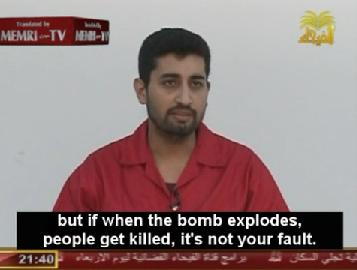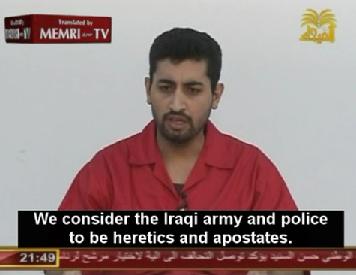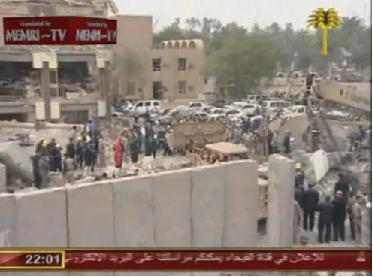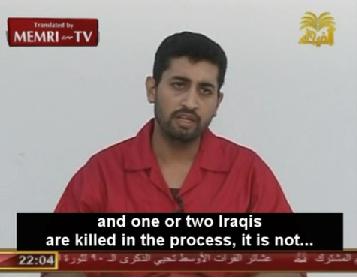
Special Dispatch|3092| July 13, 2010Iraq/Jihad and Terrorism Threat Monitor | |
Former Al-Qaeda Military Emir of Baghdad Justifies Killing of Civilians as Collateral Damage in Terrorist AttacksFollowing are excerpts from an interview with Abbas Al-Jiwari, former Al-Qaeda military Emir of Baghdad. The interview aired on Al-Fayhaa TV on June 30, 2010. To view this clip on MEMRI TV, visit http://www.memritv.org/clip/en/0/0/0/0/0/0/2533.htm. The complimentary full text of this report is made available from the MEMRI Jihad and Terrorism Threat Monitor (JTTM).
"With the Arrival of the Occupation, I Left School, and Began Jihad Activity Against the Occupation in Falluja"
Abbas Al-Jiwari: "My name is Abbas Najm Abdallah Muhammad Al-Jiwari." Interviewer: "Is that your real name?" Abbas Al-Jiwari: "Yes. I was born in Falluja in 1984." [...] Interviewer: "What is your profession?" Abbas Al-Jiwari: "I was at school. I reached 11th grade." Interviewer: "And after that?" Abbas Al-Jiwari: "With the arrival of the occupation, I began operating..." Interviewer: "How old were you in 2003?" Abbas Al-Jiwari: "I don't remember exactly." Interviewer: "Were you 19?" Abbas Al-Jiwari: "Something like that. With the arrival of the occupation, I left school, and began Jihad activity against the occupation in Falluja. [...] "My two brothers were killed in the battle of Falluja." Interviewer: "Who were they?" Abbas Al-Jiwari: "My older brother was Sheikh Abdallah..." Interviewer: "Which Sheikh Abdallah?" Abbas Al-Jiwari: "Abu 'Azzam. My younger brother was killed in the second battle of Falluja." Interviewer: "Abu 'Azzam was the Emir of Al-Qaeda." [...] "You Try... To Avoid Harming Civilians – But If When the Bomb Explodes People Get Killed, It's Not Your Fault"
Abbas Al-Jiwari: "When the Americans entered Falluja and people left the city, my family moved to Baghdad, and there, the Americans raided our home and arrested us. I was in jail for a year and a half." Interviewer: "For no reason?" Abbas Al-Jiwari: "My uncle was wanted. [...] "Al-Qaeda is well organized and structured. It has emirs, cadres, and a modus operandi. At the beginning, in Falluja, there were many active groups, but the strongest organization, with the greatest authority, was Al-Tawhid Wal-Jihad." Interviewer: "Didn't you take orders from your brother, Abu 'Azzam?" Abbas Al-Jiwari: "Not at first. Of course, Abu 'Azzam was well known in Falluja, because he was an imam and a preacher. In general, our family is well known in Falluja. So obviously, I received instructions from him, but there was no organization and no orders. Whoever had a weapon would do what he could." Interviewer: "Approximately when did you join Al-Qaeda?" Abbas Al-Jiwari: "From the beginning of the occupation, I was fighting, in keeping with the ideology of Al-Qaeda. [...] "When you plant a bomb in the street, you try, as much as you can, to avoid harming civilians, but if when the bomb explodes, people get killed, it's not your fault." [...] Interviewer: "Did you return to Al-Qaeda [after your release] and carry out more attacks?" Abbas Al-Jiwari: "Of course. Shortly after my release from prison, I started my activity in Falluja again, and later, I became the Emir of Falluja." [...] Interviewer: "Let me ask you something. To the best of your knowledge, how many Iraqi victims were there in these operations, along with whatchamacallit... the American casualties?" Abbas Al-Jiwari: "In my time, after the second battle of Falluja, I don't recall any civilian casualties. The casualties were from among the National Guard and the police, but I don't remember any civilian casualties." [...] "We Consider the Iraqi Army and Police To Be Heretics and Apostates"
Abbas Al-Jiwari: "We consider the Iraqi army and police to be heretics and apostates." Interviewer: "But take someone who has been a policeman in Falluja for 10 years. Along came the Americans, and he continued to be a policeman. He didn't start working as a doctor..." Abbas Al-Jiwari: "In our view..." Interviewer: "Allow me for a second...His problem is his profession. He had been a policeman for 10 years, and then the Americans came. What is his crime?" Abbas Al-Jiwari: "In our view, even the policemen under Saddam were apostates." Interviewer: "Even in the days of Saddam?" Abbas Al-Jiwari: "Yes. Allah says..." Interviewer: "But you did not carry out any attacks whatsoever..." Abbas Al-Jiwari: "We did not have the ideology and the notion back then. We did not have the possibility... In the days of Saddam Hussein, even the walls had ears, as they say. There was no possibility to conduct any activity." Interviewer: "I thank you for this observation. We shall pass it on to the relevant ministries." [...] "We Carried Out the Attacks Against the Foreign Ministry, the Finance Ministry, the Ministry of Justice... "
Abbas Al-Jiwari: "We carried out the attacks against the Foreign Ministry, the Finance Ministry, the Ministry of Justice, the Provincial Council, the second location of the Finance Ministry, the criminal Zawraa Court, the forensics, the legal council, and the embassies." Interviewer: "And after that?" Abbas Al-Jiwari: "That was it." Interviewer: "What about the hotels?" Abbas Al-Jiwari: "Oh, yes, the hotels." [...] "If, For Example, You Kill a Large Number of Americans... And One or Two Iraqis Are Killed In the Process..."
Abbas Al-Jiwari: "If a certain target is valuable and will deliver a blow to the infidels..." Interviewer: "One American is worth 99 Iraqis?" Abbas Al-Jiwari: "No, it's not like that." Interviewer: "So what is your rate?" Abbas Al-Jiwari: "If, for example, you kill a large number of Americans – say, 10, 15, or 20 – and one or two Iraqis are killed in the process, it is not..." Interviewer: "His wife, his dependents, and his children will find themselves in the street." [...] |


























